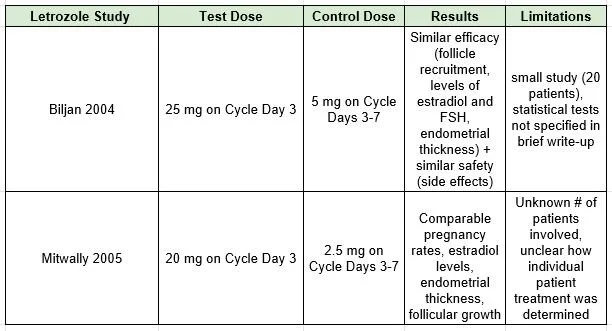Letrozole to Get Pregnant - Is Just One Dose Enough?
A recent study looked at the impact of taking just one dose of letrozole to improve fertility.
Letrozole is a drug that helps women who do not ovulate regularly. It blocks estrogen receptors in the brain, which enables follicle stimulating hormone (FSH) to kickstart the growth of ovarian follicles. Typically, it’s taken on days 3 to 7 of the menstrual cycle (a five day treatment course). Due to undesirable side effects, which include dizziness, headaches, and bloating, decreasing the time spent on letrozole could increase the tolerability of ovulation induction… assuming that a lower dose is just as effective.
Study Background
WHAT
Does a one-time dose of letrozole work as effectively to induce ovulation, leading to pregnancy, versus the typical five-day letrozole treatment?
WHO
586 women on their first cycle of intrauterine insemination (IUI)
Infertility diagnoses specifically included ovulatory dysfunction, male factor infertility, or unexplained infertility
No exclusion criteria based on fertility diagnosis — unknown proportion of patients with PCOS
WHEN
January 2015 - December 2017
WHERE
One private fertility clinic in Baton Rouge, Louisiana, USA
HOW
302 women took 25 mg letrozole once on Cycle Day 3
162/302 (54%) also injected gonadotropins at physician’s discretion
284 took 5 mg letrozole daily for five days on Cycle Days 3-7
99/284 (35%) also injected gonadotropins at physician’s discretion
Physicians, not randomization, determined patient letrozole dosing
All patients
Ultrasound monitoring on Cycle Days 1, 5, 10-12
Triggered release of oocyte (egg) from follicle via 10,000 IU injection of human chorionic gonadotropin (hCG)
Study Results
Determined via medical record review
Differences at baseline between groups
One-time dose women were younger (31.0 vs. 31.8, p=0.03) with lower BMIs (26.2 vs. 27.4, p=0.02)
In women also taking gonadotropins, one-time letrozole women had lower BMIs (27.19 vs. 29.1, p=0.048)
No baseline differences in smoking status, # of pregnancies, sperm concentration
No differences in rates of pregnancy, live birth, or miscarriage
Authors’ Thoughts
Baseline differences between groups are not clinically significant
For ovulation induction, one 25 mg letrozole dose seems equivalent compared to traditional dosing
One 25 mg letrozole dose can be considered an alternative method to induce ovulation before IUI
Earlier studies using a one-time letrozole dose… is a one-time dose of 20 mg dose of letrozole as effective as a one-time dose of 25 mg in IUI? To date, no study has determined the optimal one-time letrozole dose.
This Pharmacist’s Thoughts
Strengths
Largest study to date that compares letrozole doses in ovulation induction
Study measured the intended outcomes (pregnancy, live birth, etc.) vs. surrogate markers
Weaknesses
Physician selection of letrozole and gonadotropin dosing (vs. randomization) — opportunity for selection bias
Baseline differences between groups in age and BMI
Without knowing which women in this study had PCOS or other medical conditions, it’s unclear which women could succeed with the one-time letrozole dose
Lack of information about tolerability and side effects
Conclusions
As many details need to be clarified about which dose and which patients would be appropriate for a shortened letrozole course, five day dosing should remain the status quo until higher quality studies can provide that clarification.
Resources
Biljan MM, Tkalec DD, Lachgar H. A study comparing a single dose of 25mg of letrazole given on day 3 of menstrual cycle with a daily dose of 5mg of letrazole given between day 3 and day 7 of menstrual cycle in patients with unexplained infertility: Prospective randomized double blind trial. Fertil Steril. 2004; 82:S81. doi.org/10.1016/j.fertnstert.2004.07.206
Femara [package insert]. East Hanover, NJ: Novartis Pharmaceuticals Corporation; 2014.
Letrozole. MedlinePlus [Internet]. Bethesda (MD): U.S. National Library of Medicine; [1998 Oct] - [updated 2018 Jan 15; cited 2020 Sept 16]. Available from: https://medlineplus.gov/druginfo/meds/a698004.html. English, Spanish.
Maladkar, Manish, et al. “Letrozole: An Emerging Array of Hope for Infertile Women.” International Journal of Reproduction, Contraception, Obstetrics and Gynecology, vol. 9, no. 2, Jan. 2020, pp. 891–99. www.ijrcog.org, doi:10.18203/2320-1770.ijrcog20200402.
McGrail K, Conway S, Storment J, Buzhardt S, Chappell N, Pregnancy Rates from Intrauterine Insemination Are Equivalent Following One- versus Five-Day Letrozole Administration for Ovulation Induction: A retrospective study, F&S Reports (2020), doi: https://doi.org/10.1016/ j.xfre.2020.07.003.
Mitwally MF, Casper RF. Single-dose administration of an aromatase inhibitor for ovarian stimulation. Fertil Steril. 2005;83(1):229-231. doi:10.1016/j.fertnstert.2004.07.952






